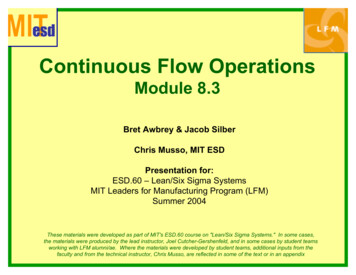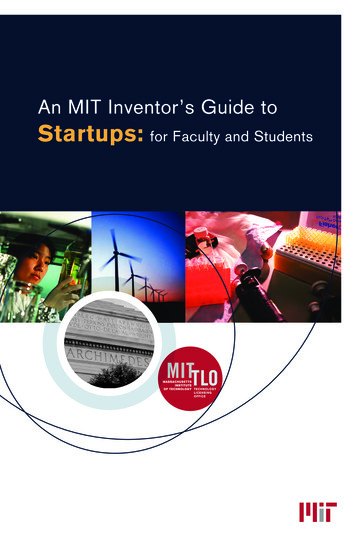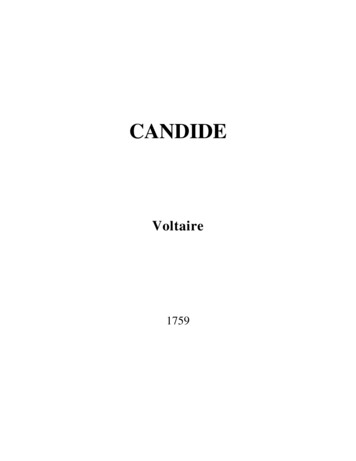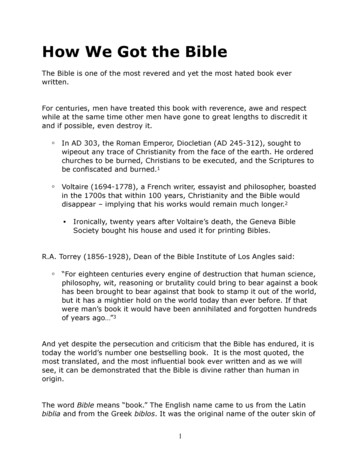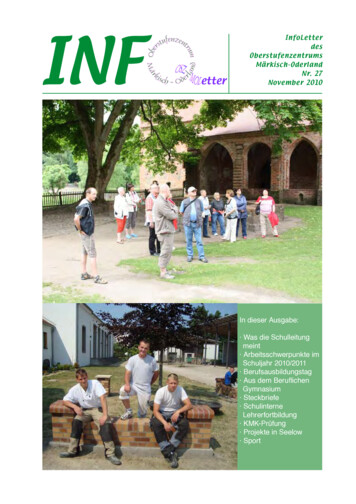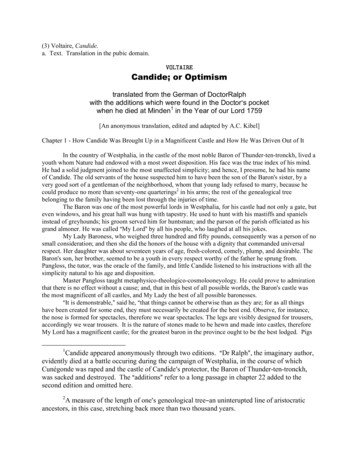
Transcription
(3) Voltaire, Candide.a. Text. Translation in the pubic domain.VOLTAIRECandide; or Optimismtranslated from the German of DoctorRalphwith the additions which were found in the Doctor s pocketwhen he died at Minden1 in the Year of our Lord 1759[An anonymous translation, edited and adapted by A.C. Kibel]Chapter 1 - How Candide Was Brought Up in a Magnificent Castle and How He Was Driven Out of ItIn the country of Westphalia, in the castle of the most noble Baron of Thunder-ten-tronckh, lived ayouth whom Nature had endowed with a most sweet disposition. His face was the true index of his mind.He had a solid judgment joined to the most unaffected simplicity; and hence, I presume, he had his nameof Candide. The old servants of the house suspected him to have been the son of the Baron's sister, by avery good sort of a gentleman of the neighborhood, whom that young lady refused to marry, because hecould produce no more than seventy-one quarterings2 in his arms; the rest of the genealogical treebelonging to the family having been lost through the injuries of time.The Baron was one of the most powerful lords in Westphalia, for his castle had not only a gate, buteven windows, and his great hall was hung with tapestry. He used to hunt with his mastiffs and spanielsinstead of greyhounds; his groom served him for huntsman; and the parson of the parish officiated as hisgrand almoner. He was called AMy Lord@ by all his people, who laughed at all his jokes.My Lady Baroness, who weighed three hundred and fifty pounds, consequently was a person of nosmall consideration; and then she did the honors of the house with a dignity that commanded universalrespect. Her daughter was about seventeen years of age, fresh-colored, comely, plump, and desirable. TheBaron's son, her brother, seemed to be a youth in every respect worthy of the father he sprung from.Pangloss, the tutor, was the oracle of the family, and little Candide listened to his instructions with all thesimplicity natural to his age and disposition.Master Pangloss taught metaphysico-theologico-cosmolooneyology. He could prove to admirationthat there is no effect without a cause; and, that in this best of all possible worlds, the Baron's castle wasthe most magnificent of all castles, and My Lady the best of all possible baronesses.AIt is demonstrable,@ said he, Athat things cannot be otherwise than as they are; for as all thingshave been created for some end, they must necessarily be created for the best end. Observe, for instance,the nose is formed for spectacles, therefore we wear spectacles. The legs are visibly designed for trousers,accordingly we wear trousers. It is the nature of stones made to be hewn and made into castles, thereforeMy Lord has a magnificent castle; for the greatest baron in the province ought to be the best lodged. Pigs1Candide appeared anonymously through two editions. ADr Ralph@, the imaginary author,evidently died at a battle occuring during the campaign of Westphalia, in the course of whichCunégonde was raped and the castle of Candide s protector, the Baron of Thunder-ten-tronckh,was sacked and destroyed. The Aadditions@ refer to a long passage in chapter 22 added to thesecond edition and omitted here.2A measure of the length of one s geneological treeBan uninterupted line of aristocraticancestors, in this case, stretching back more than two thousand years.
were intended to be eaten, therefore we eat pork all the year round: and they, who assert that everything isright, do not express themselves correctly; they should say that everything is best.@Candide listened attentively and believed implicitly, for he thought Miss Cunégonde excessivelyhandsome, though he never had the courage to tell her so. He concluded that next to the happiness of beingBaron of Thunder-ten-tronckh, the next was that of being Miss Cunégonde, the next that of seeing herevery day, and the last that of hearing the doctrine of Master Pangloss, the greatest philosopher of thewhole province, and consequently of the whole world.One day when Cunégonde went to take a walk in a little neighboring wood which was called apark, she saw, through the bushes, the sage Doctor Pangloss giving a lecture in experimental philosophy toher mother's chambermaid, a pretty brunette, and very obedient. As Cunégonde had a great disposition forthe sciences, she observed with the utmost attention the experiments which were repeated before her eyes;she perfectly well understood the doctor s sufficient reason and the force of causes and effects. She retiredgreatly flurried, quite pensive and filled with the desire of knowledge, imagining that she might be asufficient reason for young Candide, and he for her.On her way back she happened to meet the young man; she blushed, he blushed also; she wishedhim a good morning in a faltering tone, he returned the salute, without knowing what he said. The nextday, as they were rising from dinner, Cunégonde and Candide slipped behind the screen. The miss droppedher handkerchief, the young man picked it up. She innocently took hold of his hand, and he as innocentlykissed hers with a warmth, a sensibility, a grace-all very particular; their lips met; their eyes sparkled; theirknees trembled; their hands strayed. The Baron chanced to come by; he beheld the cause and effect, and,without hesitation, saluted Candide with some notable kicks on his backside and drove him out of doors.The lovely Cunégonde fainted away, and, as soon as she came to herself, the Baroness boxed her ears.Thus a general consternation was spread over this most magnificent and most agreeable of all possiblecastles.Chapter 2 - What Befell Candide among the BulgariansCandide, thus driven out of this terrestrial paradise, rambled a long time without knowing where hewent; sometimes he raised his eyes, all bedewed with tears, towards heaven, and sometimes he cast amelancholy look towards the magnificent castle, where dwelt the fairest of young baronesses. He laidhimself down to sleep in a furrow, heartbroken, and supperless. The snow fell in great flakes, and, in themorning when he awoke, he was almost frozen to death; however, he made shift to crawl to the next town,which was called Wald-berghoff-trarbkdikdorff, without a penny in his pocket, and half dead with hungerand fatigue. He took up his stand at the door of an inn. He had not been long there before two men dressedin blue3 fixed their eyes steadfastly upon him.ALook,@ said one of them to the other, Athere s a well-made young man of the right size.@ Uponwhich they came up to Candide and with the greatest civility and politeness invited him to dine with them.AGentlemen,@ replied Candide, with a most engaging modesty, you do me much honor, but uponmy word I have no money.@AMoney, sir!@ said one of the blues to him, Ayoung persons of your appearance and merit never payanything; why, are not you five feet five inches high?@3Candide is about to be recruited into the Prussian army and do his bit in the Seven YearsWar (1756-63) between the Prussians and the French, a conflict which had the usual effects ofwarfare upon the countysides of central Europe. The recruiting officers of Frederick the Greatwore blue uniforms and were feared in villages everywhere they showed up. As for the remarkabout Candide s size: Frederick reputedly tried to have units of his armyBcompanies andregimentsBcomposed of soldiers of roughly the same size in order to produce an impression ofuniformity when they were on parade.
AYes, gentlemen, that is indeed my size,@ replied he, with a low bow.ACome then, sir, sit down along with us; we will not only pay your reckoning, but will never suffersuch a clever young fellow as you to want money. Men were born to assist one another.@AYou are perfectly right, gentlemen,@ said Candide, Athis is precisely the doctrine of MasterPangloss; and I am convinced that everything is for the best.@His generous companions next entreated him to accept of two crowns4, which he readily compliedwith, at the same time offering them his note for the payment, which they refused, and sat down to table.AHave you not a great affection forCA@O yes! I have a great affection for the lovely Cunégonde.@AMaybe so,@ replied one of the blues, Abut that is not the question! We were going to ask youwhether you have a great affection for the King of the Bulgarians@AFor the King of the Bulgarians?@ said Candide. AOh, Lord! not at all, why I never saw him in mylife.@AIs it possible? Oh, he is a most charming king! Come, we must drink his health.@AWith all my heart, gentlemen,@ said Candide, and off he tossed his glass.ABravo!@ cried the blues; Ayou are now the support, the defender, the hero of the Bulgarians; yourfortune is made; you are in the high road to glory.@So saying, they handcuffed him, and carried him away to the regiment. There he was made towheel about to the right, to the left, to draw his rammer, to return his rammer, to present, to fire, to march,and they gave him thirty blows with a cane; the next day he performed his exercise a little better, and theygave him but twenty; the day following he came off with ten, and was looked upon as a young fellow ofsurprising genius by all his comrades.Candide was struck with amazement, and could not for the soul of him conceive how he came tobe a hero. One fine spring morning, he took it into his head to take a walk, and he marched straightforward, conceiving it to be a privilege of the human species, as well as of the brute creation, to make useof their legs how and when they pleased. He had not gone above two leagues when he was overtaken byfour other heroes, six feet high, who bound him neck and heels, and carried him to a dungeon. A courtmartial sat upon him, and he was asked which he liked better, to run the gauntlet six and thirty timesthrough the whole regiment, or to have his brains blown out with a dozen musket-balls? In vain did heremonstrate to them that the human will is free, and that he chose neither; they obliged him to make achoice, and he determined, in virtue of that divine gift called free will, to run the gauntlet six and thirtytimes.He had gone through his discipline twice, and the regiment being composed of 2,000 men, theycomposed for him exactly 4,000 strokes, which laid bare all his muscles and nerves from the nape of hisneck to his stern. As they were preparing to make him set out the third time our young hero, unable tosupport it any longer, begged as a favor that they would be so obliging as to shoot him through the head;his request being granted, a bandage was tied over his eyes, and he was made to kneel down.At that very instant, His Bulgarian Majesty happening to pass by made a stop, and inquired into thedelinquent's crime, and being a prince of great penetration, he found, from what he heard of Candide, thathe was a young metaphysician, entirely ignorant of the physical world; and therefore, out of his greatclemency, he condescended to pardon him, for which his name will be celebrated in every newspaper inevery age. A skillful surgeon made a cure of the flagellated Candide in three weeks by means of emollient4Presumably the fee paid to new recruits in compensation for enlisting.
unguents prescribed by Dioscorides5. His sores were now scabbed over and he was able to march, when theKing of the Bulgarians gave battle to the King of the Abares6.Chapter 3 - How Candide Escaped from the Bulgarians and What Befell Him AfterwardNever was anything so gallant, so well accoutered, so brilliant, and so finely disposed as the twoarmies. The trumpets, fifes, oboes, drums, and cannon made such harmony as never was heard in Hellitself. The entertainment began by a discharge of cannon, which, in the twinkling of an eye, laid flat about6,000 men on each side. The musket bullets swept away, out of the best of all possible worlds, nine or tenthousand scoundrels that were cluttering its surface. The bayonet was next the sufficient reason of thedeaths of several thousands. The sum of casualites might amount to thirty thousand souls. Candidetrembled like a philosopher, and concealed himself as well as he could during this heroic butchery.At length, while the two kings were causing Te Deums7 to be sung in their camps, Candide took aresolution to go and reason somewhere else upon causes and effects. After passing over heaps of dead ordying men, the first place he came to was a neighboring village, in the Abarian territories, which had beenburned to the ground by the Bulgarians, agreeably to the laws of war. Here lay a number of old mencovered with wounds, who beheld their wives dying with their throats cut and hugging their children totheir breasts, all stained with blood. There several young virgins, whose bodies had been ripped open afterthey had satisfied the natural necessities of the Bulgarian heroes, breathed their last; while others,half-burned in the flames, begged to be dispatched out of the world. The ground about them was coveredwith the brains, arms, and legs of the dead.Candide made all the haste he could to another village, which belonged to the Bulgarians, andthere he found the heroic Abares had enacted the same tragedy. Thence continuing to walk over twitchinglimbs or through ruined buildings, at length he got beyond the theater of war, with a little food in hisbackpack and Cunégonde's image in his heart. When he arrived in Holland his food ran out, but havingheard that the inhabitants of that country were all rich and Christians, he was sure that he would be treatedby them as he had been at the Baron's castle before he had been driven thence through the power ofCunégonde's bright eyes.He asked charity of several grave-looking people, who one and all answered him that if hecontinued to follow this trade they would have him sent to the house of correction, where he should betaught to get his bread. He next addressed himself to a person who had just come from haranguing anumerous assembly for a whole hour on th
four other heroes, six feet high, who bound him neck and heels, and carried him to a dungeon. A court-martial sat upon him, and he was asked which he liked better, to run the gauntlet six and thirty times through the whole regiment, or to have his brains blown out with a dozen musket-balls? In vain did he remonstrate to them that the human will is free, and that he chose neither; they obliged .


